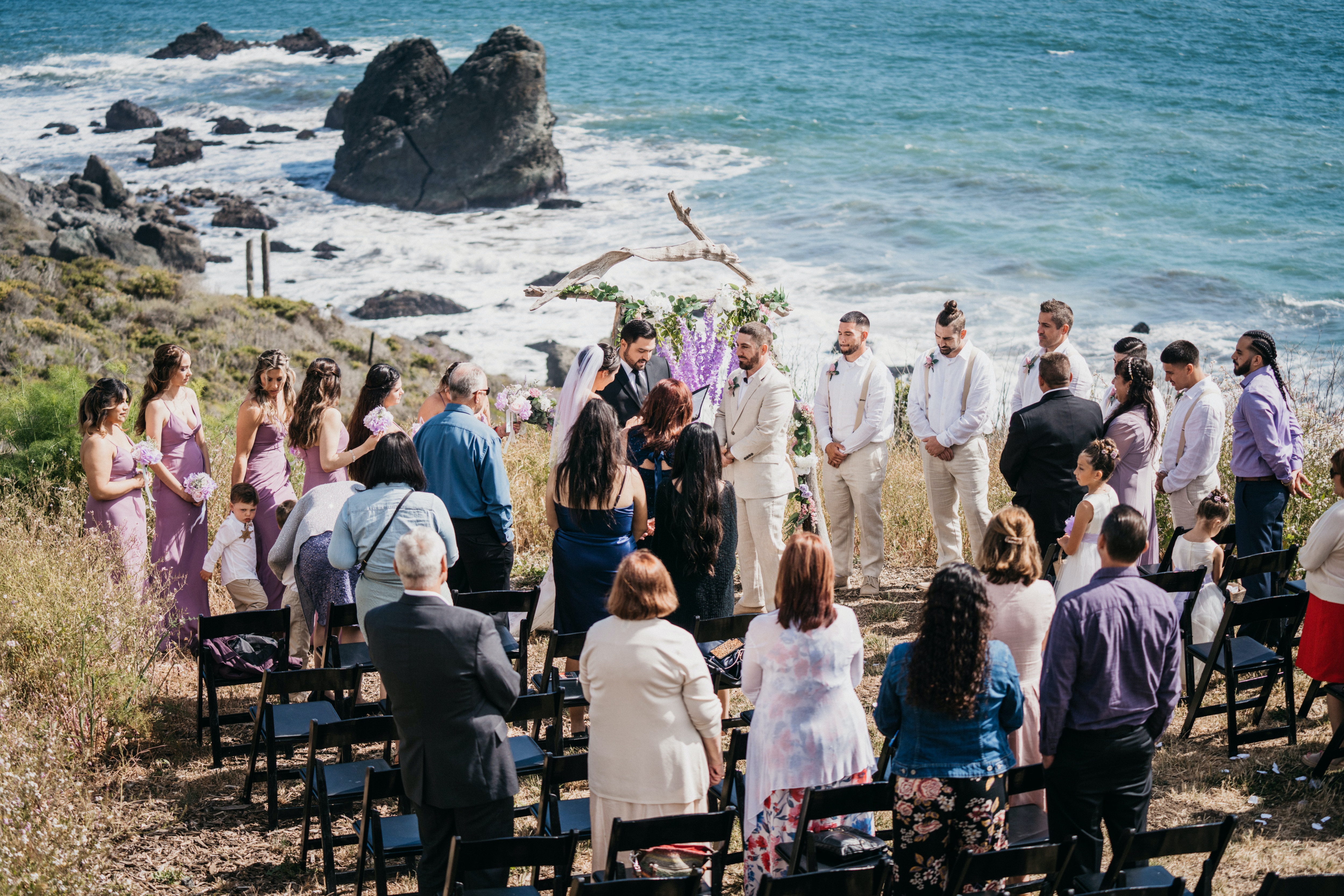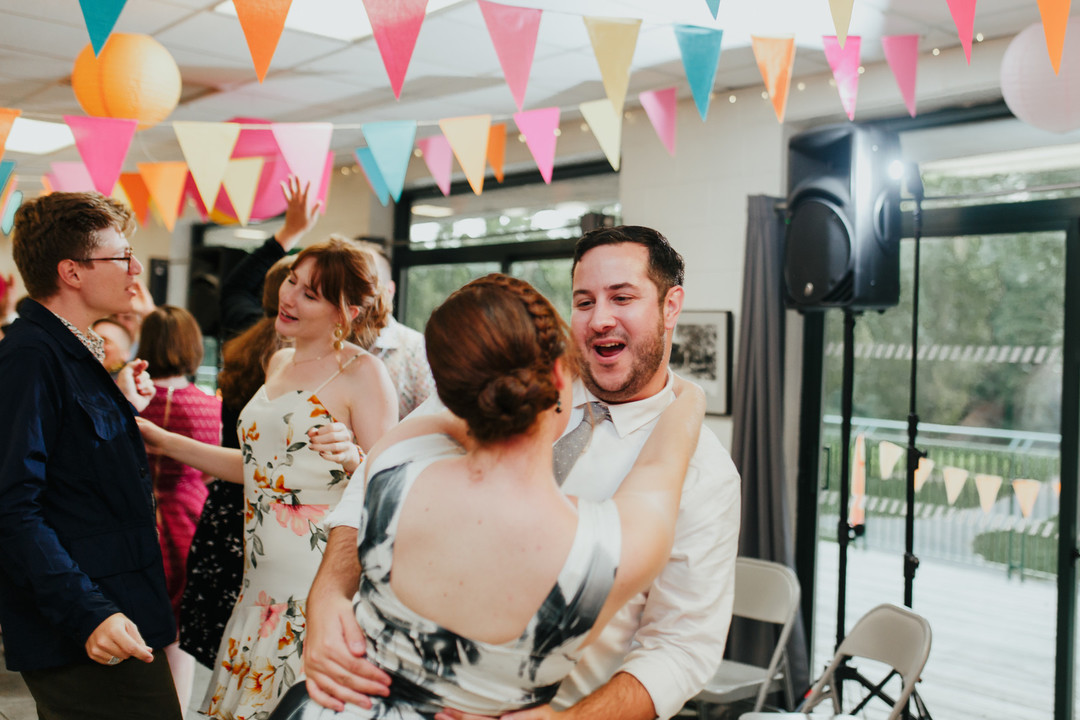- Expert advice/
- Wedding planning 101/
- Wedding planning questions/
- How to Become a Wedding Officiant
- Wedding planning questions
How to Become a Wedding Officiant
Thinking about becoming a wedding officiant? Follow these 5 steps to make it official.
Last updated February 5, 2024

The First Look ✨
- Do your research ahead of time: Check the relevant jurisdiction’s marriage laws to find out what requirements exist for officiating weddings.
- You’ll likely need to get ordained, but luckily the process is cheap and easy online.
- Finally, you may need to register with the state in order to officiate marriages.
Officiating the wedding of friends or family is an honor that allows you to play a special part in the big day. That said, if you’ve never officiated a wedding before, it can be difficult to know what you need to do in order to legally perform the marriage. If you’re in this situation, you’re in luck: we’ve done the research for you. Below, find details on how to become a wedding officiant or jump straight to a step depending on where you are in the process:
- Start the process early.
- Check the state’s marriage laws.
- Get ordained.
- Register with the state.
- Plan the ceremony.
5 Steps To Become a Wedding Officiant
The timeline and process to become a wedding officiant may vary by organization and state. We’ve outlined the most common steps you’ll need to follow in order to become a wedding officiant.
Step 1: Start The Process Early
- The time it takes to become legally able to perform a wedding ceremony varies depending on the state’s regulations. To be safe, we recommend starting the process as soon as you’re asked to do the honors so that you have plenty of time to receive any important documentation and to resolve any issues you might encounter along the way.
- Allocating extra time will also be crucial should a new officiant need to be secured for the wedding in the event of complications registering with the state.
Step 2: Check The State’s Marriage Laws
- Every state has its own set of law and regulations for what’s required to become a wedding officiant. Familiarize yourself with the state’s laws regarding officiants to understand what steps you need to complete to legally marry people.
- Particular counties within a state (like in certain parts and wedding venues in Virginia) may not allow individuals who are not members of the clergy or civil servants to perform marriages. With that in mind, it’s a good idea to check the city laws as well.
- Find about your State’s Marriage Laws.
Step 3: Get Ordained
- For individuals who are not already ordained members of a clergy or civil servants authorized to legally marry people ((judges, court clerks, etc.), the first step is to become ordained. This sound intimidating, but becoming ordained is as easy as applying online through the ordination organization of your choice.
- Most online ordaining services do not require you to be a member of a particular religious faith and typically the process is free.
- There are hundreds of options for becoming ordained online to officiate weddings. To choose the right one for you, we recommend considering the following:
- Does the organization represent your beliefs and values?
- Does the organization have resources, such as sample ceremonies, to help you officiate your first wedding?
- Is the organization a federally recognized 501(c)3 religious organization? Pro Tip: If not, then your ordination is likely not legal.
Step 4: Register With The State (If Required)
- Once you are ordained (and have received your certification of ordination), refer back to Step 1 to see if you need to register with the state. In some states you only need to be ordained to perform a marriage, while others require that you register and/or obtain special licensing (with fees that vary by state).
- In some states, you must supply a letter of good standing from the ordaining organization to register.
Step 5: Plan the Ceremony
Congratulations - you’ve completed all of the legal requirements and are ready to plan the ceremony. Make sure to sit down with the soon-to-be-wedded-couple to better understand what they expect from their ideal ceremony. Be sure to ask questions about the couple’s story, making sure to understand the specific details, inside jokes, and themes they’d like to incorporate into their big day. Once you’ve nailed your script, make sure to practice! Study the ceremony’s order of events and rehearse your presentation.
Up next for you

Bridal Shower Gifts Guide + Ideas
Inspiration
All of your bridal shower gifts questions answered. Explore expert advice on how much to spend, what to give, group gift ideas, & what to do if there’s no registry!

Dos and Don'ts for Wedding Guests
Inspiration
Check out our list of dos and don’ts for wedding guests to avoid any embarrassing wedding faux pas.

Dos and Don'ts of Wedding Guest Fashion
General etiquette
With all those invites on your fridge, you’re probably asking yourself a few questions: what do you want for dinner in four months? Do you have a plus one? And most importantly, what are you going to wear? Here are a few wedding guest fashion tips, do's, and don’ts to ensure you are faux pas-free and win the award for best dressed.

Group Gifting 101: 26 Group Wedding Gift Ideas + Tips
Gift Etiquette
One of our favorite Zola features is Group Gifting–where your friends, coworkers, and family members can go in on your wedding gifts together completely hassle-free. Here's how to use group gifting on your wedding registry.
Featured

Do I Have to Buy a Wedding Shower Gift and a Wedding Gift?
Advice
It's a common question and the answer isn't always straightforward. Here's everything you need to know about wedding gifts and wedding shower gifts.

How Soon is Too Soon To Ask Someone to Be Your +1?
Advice
So, you get to bring a plus-one to that wedding—but who should it be? Find out how to narrow down your choices and figure out if it's too soon to ask someone to be your plus-one here.

Black Tie Wedding Attire: Do's and Don'ts
Advice
Don't know what to wear to a black-tie wedding? Discover essential do's and don'ts for a flawless, elegant look. Dress to impress with our expert guide.

Wedding Guest Attire: A Guide to Every Dress Code
How-To
Dress to impress! Your go-to guide for wedding guest attire, from formal to casual. Find the perfect look for every dress code and celebration.
- Expert advice/
- Wedding planning 101/
- Wedding planning questions/
- How to Become a Wedding Officiant
Find even more wedding ideas, inspo, tips, and tricks
We’ve got wedding planning advice on everything from save the dates to wedding cakes.
